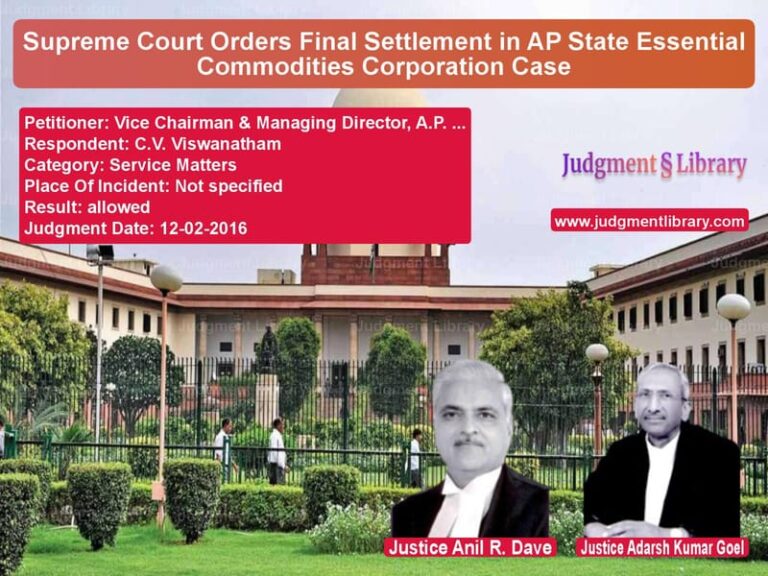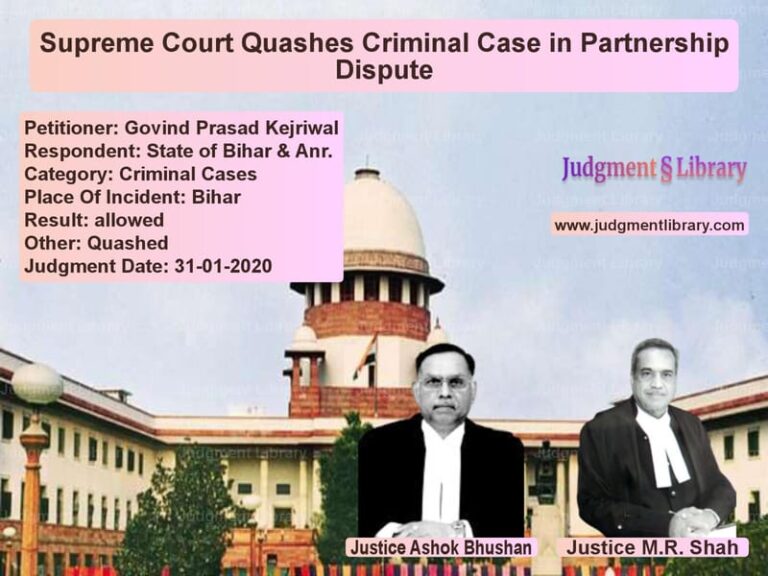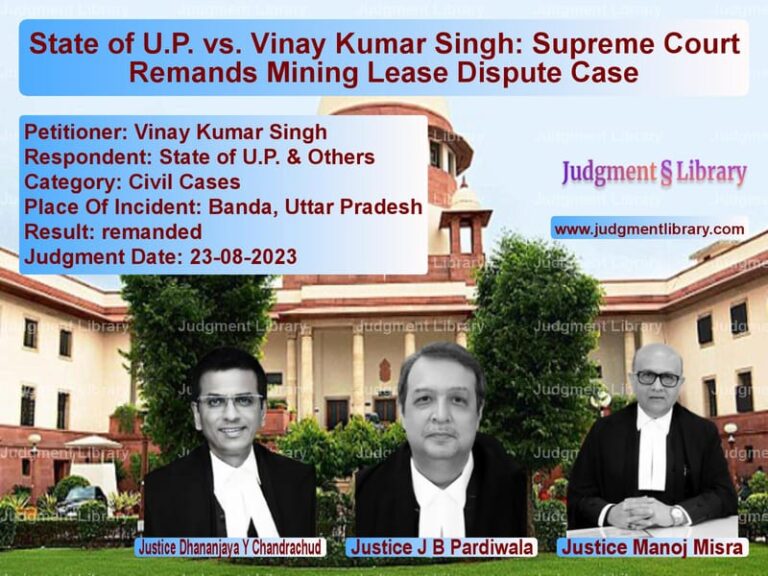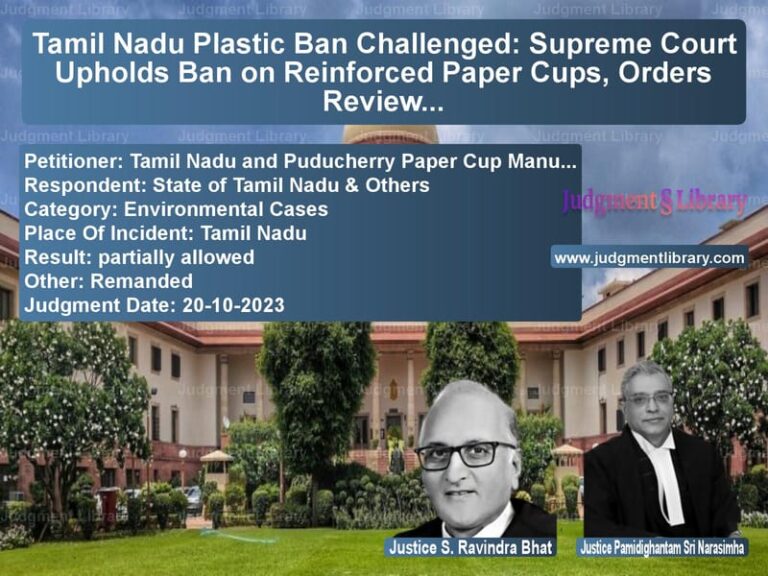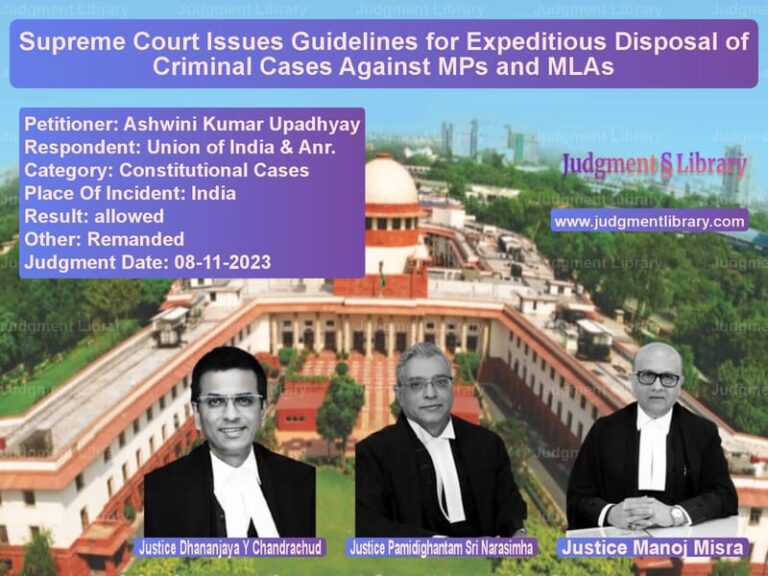Divorce by Mutual Consent: Supreme Court Orders Family Court to Convert Petition
The Supreme Court of India, in its judgment dated February 25, 2022, resolved a matrimonial dispute between Surbhi Sharma and Ranjeet Sharma by approving a mutual consent divorce. The Court allowed the petitioners to convert their pending divorce petition into one under Section 13(B) of the Hindu Marriage Act, 1955, in accordance with the terms of a settlement deed signed by both parties on December 24, 2021.
Background of the Case
The case began with the filing of a divorce petition by Surbhi Sharma in 2019, seeking dissolution of marriage. The petition was pending before the Principal Judge of the Family Court in Bengaluru. During the proceedings, both parties came to an agreement and decided to settle their differences amicably. They executed a settlement deed on December 24, 2021, outlining the terms of their mutual divorce.
The settlement deed included provisions for mutual consent divorce and addressed all outstanding issues between the parties, including the financial arrangements and custody of children. Based on this, they jointly requested the Family Court to treat the pending petition as a petition for divorce by mutual consent under Section 13(B) of the Hindu Marriage Act, 1955.
Read also: https://judgmentlibrary.com/transfer-petition-in-matrimonial-case-withdrawn-before-supreme-court/
Legal Proceedings
- 2019: The petitioner filed a divorce petition in the Family Court, Bengaluru, seeking dissolution of marriage.
- December 24, 2021: The petitioner and respondent executed a settlement deed, resolving all disputes and agreeing to proceed with a mutual consent divorce.
- February 25, 2022: The Supreme Court reviewed the petition and settlement deed, allowing the conversion of the petition into a mutual consent divorce petition.
Arguments Presented
Petitioner’s (Surbhi Sharma’s) Arguments
The petitioner contended:
- The marriage had irretrievably broken down, and both parties had agreed to resolve all issues amicably.
- The settlement deed was duly executed and signed by both parties, and it included provisions for a mutual consent divorce under Section 13(B) of the Hindu Marriage Act.
- There was no need for further legal proceedings, as both parties had reached an agreement and were seeking the dissolution of the marriage.
Respondent’s (Ranjeet Sharma’s) Arguments
The respondent, Ranjeet Sharma, also supported the petition and argued:
- Both parties had agreed on all terms outlined in the settlement deed, including the dissolution of the marriage.
- There were no outstanding issues between the parties, and they had resolved the matter amicably.
- He requested the Court to allow the conversion of the divorce petition into a mutual consent divorce petition under Section 13(B).
Supreme Court’s Observations
On the Nature of the Settlement
The Court noted:
“The parties have reached an agreement through mutual consent, and the terms outlined in the settlement deed appear to address all pending issues between the parties.”
On the Conversion of the Petition
The Court observed:
“Considering the settlement deed and the joint prayer made by both parties, the Family Court is directed to treat the pending petition as one under Section 13(B) of the Hindu Marriage Act, 1955. The period of pendency of the petition shall be treated as a cooling-off period.”
On the Role of the Family Court
The Court directed:
“The Family Court shall proceed to pass a decree of divorce in terms of the settlement deed.”
Final Judgment
The Supreme Court ruled:
- The petition was allowed and the request for conversion of the divorce petition into a petition under Section 13(B) of the Hindu Marriage Act was granted.
- The petitioner and respondent were directed to appear before the Family Court on March 4, 2022, either physically or through video conference.
- The Family Court was ordered to treat the period of pendency as the cooling-off period required under Section 13(B) and proceed to pass a decree in terms of the settlement.
Implications of the Judgment
This ruling has significant implications for matrimonial disputes:
- Mutual Consent Divorce: The Court affirmed the importance of mutual consent divorce and supported the use of settlement deeds as a valid basis for divorce proceedings.
- Judicial Efficiency: The Court’s decision to convert the divorce petition reflects an efficient resolution mechanism, as it avoided protracted litigation where both parties were in agreement.
- Cooling-off Period: The judgment reinforced the importance of the cooling-off period in mutual consent divorce petitions, ensuring both parties are given adequate time to reconsider.
The Supreme Court’s decision provided a streamlined and amicable resolution for the parties, reinforcing the principle that mutual consent divorces should be facilitated by the judiciary when both parties agree.
Petitioner Name: Surbhi Sharma.Respondent Name: Ranjeet Sharma.Judgment By: Justice Abhay S. Oka.Place Of Incident: Bengaluru.Judgment Date: 25-02-2022.
Don’t miss out on the full details! Download the complete judgment in PDF format below and gain valuable insights instantly!
Download Judgment: surbhi-sharma-vs-ranjeet-sharma-supreme-court-of-india-judgment-dated-25-02-2022.pdf
Directly Download Judgment: Directly download this Judgment
See all petitions in Alimony and Maintenance
See all petitions in Child Custody
See all petitions in Mutual Consent Divorce
See all petitions in Judgment by Abhay S. Oka
See all petitions in allowed
See all petitions in supreme court of India judgments February 2022
See all petitions in 2022 judgments
See all posts in Divorce Cases Category
See all allowed petitions in Divorce Cases Category
See all Dismissed petitions in Divorce Cases Category
See all partially allowed petitions in Divorce Cases Category


